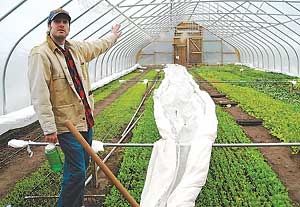Shoppers interested in buying Shannon Brines’ locally grown organic produce may want to arrive at the Kerrytown farmer’s market early Saturday morning.
“I have developed a following and sometimes I run out pretty quickly,” says Brines, who works as an environmental spatial analysis lab manager at the School of Natural Resources and Environment (SNRE).

Brines owns and operates an organic farm, focusing his production toward crops that can be grown during the offseason. “In the winter the farmers market can get pretty sparse,” Brines says. “My goal is to give people access to quality food year-round.”
Sustaining four-season agricultural production in Michigan is no easy task. In order to accomplish this, Brines constructed three simple greenhouses on his farm in Dexter, where he grows durable crops such as lettuce, arugula and spinach.
The main difference between locally grown organic food and the organic produce at a grocery store is the degree of separation between the farmer and the consumer. “Know your farmer is my motto,” Brines says, “and the biggest advantage of buying locally is you can ask the person you are buying from questions about how the food was grown.”
Brines, an organic farmer since 2004, is involved in a number food and farming organizations. International food organization Slow Food selected Brines to attend the Terre Madre world food conference in October in Turino, Italy. Brines also serves on the Kerrytown farmer’s market commission, and he helped organize the first-ever Ann Arbor homegrown festival in September.

Through his involvement in these organizations, Brines hopes to expand interest in producing and consuming sustainable, locally grown food. “We need to come up with the next generation of farmers,” he says. “You’re basically starting a small business. You need a support network … you need land.”
Brines, who lives in Ann Arbor, built his farm on land in Dexter where his parents reside. As a child, he developed a passion for growing vegetables, fruits and maple syrup on his parents’ property.
Brines attended U-M and received a Bachelor of Science in physics with a minor in math, then he received a master’s degree from the College of Engineering.
In September 1998 Brines began working for SNRE as a geographic and information systems specialist for aquatic biologists. In 2001 he was appointed to his current position as a lab manager.
“We synthesize digital data that represents geography, put it all together so we can answer all sorts of questions,” Brines says. “It is applied geography for the modern age.” In the past decade as satellite and imaging technology has improved, so too has the depth of analysis Brines can provide. “Satellite technology just means we have more images to work with,” Brines says, “so that enables us to answer more questions with our data.”
Brines’ work is not simply an archaic high tech field; professors and graduate students from a broad array of academic disciplines consult his laboratory. His research ranges from using mapping technology to assist with a School of Public Health epidemiology project on obesity, to determine whether shade-grown or sun-grown coffee plantations in Mexico better survived a hurricane.
Brines’ work interests all come back to his goal of providing quality, locally grown food to consumers. “At work I am interested in food, agriculture, public health and how this helps to create a sustainable future,” Brines says.
The weekly Spotlight features staff members at the University. To nominate a candidate, please contact the Record staff at
[email protected].

